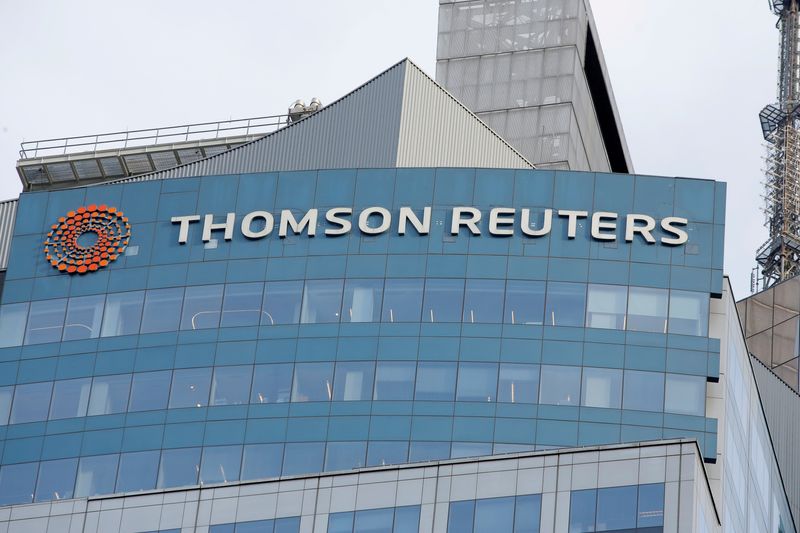By Helen Coster and Kenneth Li
NEW YORK (Reuters) -Thomson Reuters Corp on Tuesday reported higher-than-expected sales and operating profit in the first quarter, helped by divestitures and high customer retention rates, as it plans a deeper investment in artificial intelligence.
The news and information company reported adjusted earnings of 82 cents per share, beating analyst forecasts for 80 cents.
Total revenue rose 4% in the quarter to $1.738 billion, beating expectations, according to estimates from Refinitiv.
Thomson Reuters (NYSE:TRI), which owns the Westlaw legal database, Reuters news agency and the Checkpoint tax and accounting service, said organic revenue was up 7% for its "Big 3" segments: Legal Professionals, Corporates and Tax & Accounting Professionals.
"While we acknowledge elevated macroeconomic uncertainty, our underlying business is resilient,” Chief Executive Steve Hasker said in a statement.
Thomson Reuters reaffirmed most 2023 financial estimates, but trimmed its full-year total revenue growth forecast to 3% to 3.5%, from 4.5% to 5%, reflecting the sale of a majority stake in legal business management software company Elite to TPG.
In an interview with Reuters, Hasker said the company does not expect layoffs this year.
Shares, which reached a record high last month, fell about 1% in both New York and Toronto trading.
The company "delivered a good quarter" but its positives are already reflected in its shares, analyst Matt Arnold of Edward Jones said in a note, adding he saw no catalyst for Tuesday's stock decline.
Thomson Reuters plans to spend some $100 million a year to invest in artificial intelligence, Hasker said. It will start seeing generative AI incorporated into flagship products in the second half of this year. Generative AI is a type of artificial intelligence that generates new content or data in response to a prompt, or question, by a user.
The $100 million is separate from the company’s M&A budget, which will be about $10 billion from now to 2025, Michael Eastwood, Thomson Reuters' Chief Financial Officer, said in an interview.
Over the last three years, almost all of the company’s M&A budget has been allocated to artificial intelligence, and executives see that trend continuing. AI features will be incorporated in most major business divisions -- legal, tax and accounting, and in the news business.
AI is already embedded in Thomson Reuters products such as Westlaw Edge and Practical Law. In 2022, the company acquired PLX AI, a real-time financial news service powered by the technology.
The company said it sold 24.5 million shares of London Stock Exchange Group (LON:LSEG) in the first quarter for gross proceeds of $2.3 billion. As of April 30, it owned 47.4 million shares of LSEG, worth $5 billion.

Thomson Reuters said it had "increasing confidence" about its outlook but noted there were "many signs that point to a weakening global economic environment" from high interest rates and geopolitical risk.
In April, the company said it would return $2.2 billion to shareholders through a cash distribution and a reverse stock split after selling some of its LSEG shares.